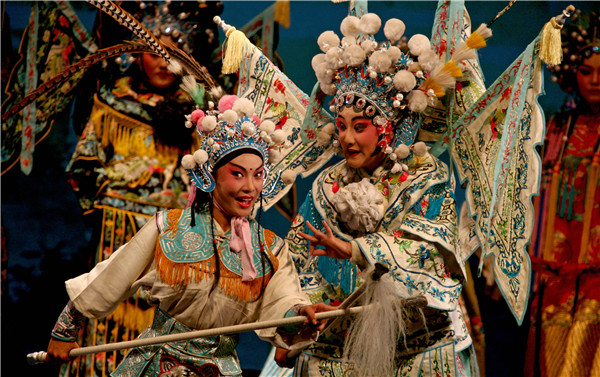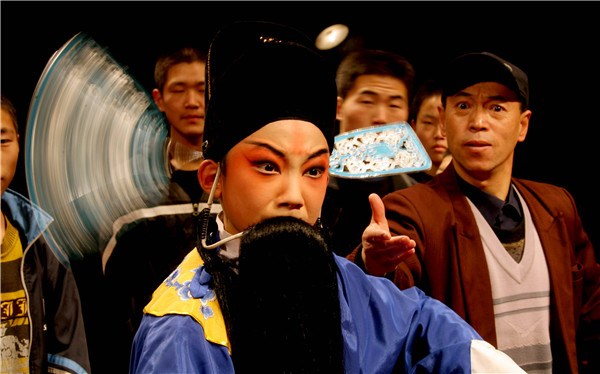Puju

It is also called Puzhou Bangzi and Shanshann Bangzi. Now it is called puju. It is named after ancient Puzhou (today's Yongji city). According to many unearthed drama relics and related materials, puju originated in Song Dynasty. It evolved from folk songs and rap in Shanxi and Shannxi areas to folk operas, and then on the basis of folk operas, it accepted the artistic achievements of ancient operas and gradually developed into grand operas. By the middle of Ming Dynasty, it had evolved into "Luantan" and "Bangzi tune" and became an independent and complete opera. Puju is mainly popular in Shanxi, Shaanxi, Henan triangle, as far as Gansu, Qinghai, Xinjiang, Inner Mongolia, Hebei and other parts of the province. Since the Republic of China, puju troupes have been established in Xi'an, Yan'an and Yanchang of Shaanxi Province, Lingbao and Lushi of Henan Province and Dingxi of Gansu Province.
During Jiajing period of Ming Dynasty, Puzhou set up Yihe class to perform. There was Yongle class in Jiaqing and Sanyi class in Xianfeng of Qing Dynasty. From the late Qing Dynasty to the early Republic of China, there were more than 20 puju troupes in the whole district. At the same time, a group of performing artists emerged, such as Guo Baochen (art name Yuanyuanhong), Wang Lai (art name laoerzhandeng), Qi Yanzi (art name yanzihong), Yun Sanji (art name Baicaixin), LV Changlin (art name Babaihei), Ren Jinxiang, sun Guangsheng, Wang Cuncai, Feng Anwa, etc., which promoted the development of Puju art.
In the development of Puju, there have been two different sources of art flow, namely, the West Road opera and the South Road opera. The South Road opera is mainly composed of 24 traditional upper, middle and lower operas, with fewer libretto and elegant diction. It is usually won by its ingenious plot and elegant style. The West Road opera is rough and bold, and its style is popular. By the end of 1930s, especially after the appearance of five famous actors of Puju, Yan Fengchun, Wang Xiulan, Zhang Qingkui, Xiao Yuelai and Yang Hushan, the art of Puju had further developed and improved. The characteristics of the West Road opera and the South Road opera gradually melted into one, which made Puju have both the fiery side, bold and generous; and the elegant side, good at expressing passion and sadness. The roles of Puju include Xusheng, Laosheng, Xiaosheng, Zhengdan (Qingyi), Xiaodan, laodan, Dajing, Erjing, clown, etc. Puju’s stunt performance is well-known in the country. The stunts such as Rankou skill, Chizi skill, Lingzi skill, Shaozi skill (shaking hair), whip skill, chair skill, fan skill and Qiaogong skill are widely used for reference by other operas. The paper flags and color skill are also very delicate and wonderful. There are more than 500 traditional complete plays and plot plays. In the 1950s and 1960s, after sorting out and adaptation, the plays still performed up to now are Xue Gang's Anti-Dynasty, Zhao's Orphan, Douer Yuan (which has been filmed), etc. In recent years, the traditional repertoires that have been sorted out and adapted include the story of the Western Chamber, Guan Gong and Shaochan, The river of Yin and Yang, Sending Daughter, and Sending Susan under Escort. In addition to the Regional Puju Troupes, there are 10 professional performance groups in different counties and cities include Hongguang puju troupe of Yongji City, Huanghe puju troupe of Ruicheng County and so on. In addition to the deceased actors Wang cuncai (Xiaodan), Yan Fengchun (Xusheng), Yang Dengyun (Erjing), Yang Hushan (Erjing), Xiao Yuelai (Xiaosheng), the main actors who are now active on the stage are Zhang Bao (Xusheng), Wu Junying (Xiaodan), Jing Xuebian (Xiaodan, Guimendan and Daomadan), Wang Yihua (Xiaosheng), Ji Youfang (Huadan), etc.

Puju Music
It is characterized by rough and high pitched. In the old times, the singer used "Sanyan tune", which is equivalent to B tune; sometimes there is "Meihua tune", which is equivalent to C tune. Now they use D or A more. The band is divided into two parts: Wenchang and Wuchang. Wenchang is composed of pipes, strings, dials and playing instruments, and Wuchang is composed of percussion. The main musical instrument of the Wenzhang is Hu Hu (Banhu in the mid-range), which is the main instrument of Puju. Flute (midrange wind instrument), Erhu, Sanxian, Suona. The Erguxian has been outdated. Recently, violin, dulcimer, Pipa, cello and trumpet have been added. Percussion music includes clappers, fingerboard, Maluo, Maoba, Bangzi, Shouluo, Jiaozi, war drum, Tanggu, Yunluo, banging bell, Daoluo, Mufu, etc. Puju music belongs to banqiang style. There are 8 main independent mode structure of vocal music, such as manban, erxing, Jinerxing, Liaoban, liushui, xiaoliushui, jianban, gunbai, etc. Besides, there are dadaoban, daoban, daoyaoban, xiaosongban, dasongban, zaqiang and huaqiang as well. There are 60 or 70 sets of tunes with gongs and drums, but there are more than 100 kinds in various forms. Tune is divided into Suona tune and Sixian tune. There are more than 100 kinds of Suona tunes and 60 kinds of Sixian tunes.

Meihu
It is originated in Meixian and Huxian County of Shaanxi Province which was introduced into this area in Jiaqing and Daoguang years of the Qing Dynasty. Wu Xiaobao, an artist of singing opera arias (without makeup and acting, commonly known as "Di tanzi"), and other artists made it performed on the stage. It is quite popular in 13 counties and cities in this area. The melody of Meihu is rich, with 72 major and 35 minor. In the early stage, most of the plays were played by the Xiaosheng, Xiao Dan and the clown. In the process of performing, the artists in this area constantly absorb and learn from the music and performing techniques of Puju. Gradually it develops into a kind of opera that can show historic story. At the beginning of the founding of new China, Meihu troupe of Yuncheng was established, which mainly performed historic plays. Later, Yuncheng and Linfen area were merged, and the troupe was renamed Meihu troupe of Jinnan area.
The plays performed include Liu Yi's Biography, Zhang Yu Boiled the Sea, San Jinshi, etc. The main actors are Yang Haisheng (Xusheng), Cheng Genhu (Xiaodan), Wei Benshan (Xiaosheng), etc. In 1957, Meihu troupe of Linyi County was established. For more than 40 years since its establishment, the troupe has been persisting in the compilation and performance of modern plays, known as a banner of literature and art serving the workers, peasants and soldiers, and serving the socialist construction. Performances include Liang Qiuyan, Jian Shui Dong Liu, Yi Ke Hong Xing, etc., and Jian Shui Dong Liu and Yi Ke Hong Xing have been successively put on the screen. The main actors are Ren Hong, Li Yingjie, Zhang Junfang, fan Lin, Guo Gaoji, etc.
Meihu Music
It is also called Quzi, which is composed of folk songs, ditty, love songs and so on. It belongs to opera music with joint structure. Meihu has always been in 72 major tunes and 36 minor. In fact, it has more than 100 kinds. The original accompaniment instruments were only Sanxian and Siyewa. After the transition to stage opera music, Banhu, flute, Erhu, Dihu, dulcimer, violin, Pipa, clarinet, Oboe, flute, etc. were successively added. Percussion instruments like drumbeats, Ciban, clappers, gongs, cymbals, etc. are added.



